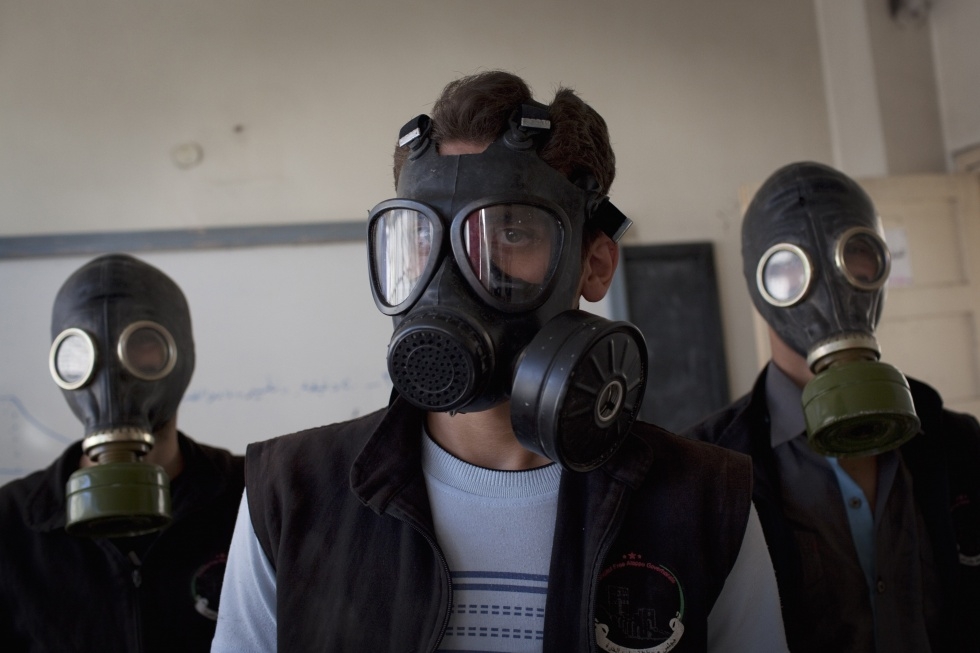Timeline: chemical weapons & the Syrian civil war

As the deadline passed Sunday for Syria to hand over its chemical weapons, this timeline looks back at the events that set the Organisation for the Prohibition of Chemical Weapons and UN's removal mission in motion.
AUGUST 2013
21: Syrian troops launch an offensive in the Damascus suburbs. The opposition accuses the army of chemical weapons strikes east and southwest of the capital, including in Moadamiyet al-Sham where hundreds are killed. The government denies responsibility and blames rebels.
23: UN Secretary General Ban Ki-moon says the use of chemical weapons would amount to a "crime against humanity". The United States mulls possible military strikes as Britain and France say the Syrian government was behind the attack.
26: Damascus ally Russia warns against military intervention without UN Security Council approval. Foreign Minister Sergei Lavrov says the West has no proof to back claims Syria's regime used chemical weapons.
Stay informed with MEE's newsletters
Sign up to get the latest alerts, insights and analysis, starting with Turkey Unpacked
29: British lawmakers vote against military action.
30: A US intelligence report blames Syria's government for the attack with "high confidence" and says 426 children were among 1,429 people killed.
31: US President Barack Obama says he will ask Congress to authorise military action.
SEPTEMBER 2013
14: The United States and Russia agree on a plan to eliminate Syria's chemical weapons by the middle of 2014.
16: A UN report says there is clear evidence that sarin gas was used on August 21.
27: The Security Council unanimously passes a landmark resolution ordering the destruction of Syria's chemical weapons.
OCTOBER 2013
6: A disarmament team, from the UN and the Organisation for the Prohibition of Chemical Weapons (OPCW) starts work on destroying the weapons and production facilities in Syria.
14: The Chemical Weapons Convention comes into force for Syria.
31: The OPCW says all of Syria's declared chemical arms production equipment has been destroyed ahead of a deadline and that its entire declared stock of more than 1,000 tonnes of chemical weapons and agents are under tamper-proof seal.
NOVEMBER 2013
7: Inspectors have verified all but one of Syria's 23 declared chemical weapons sites, the OPCW says.
APRIL 2014
12: Syria's state television and militants swap accusations over an attack that reportedly caused "suffocation and poisoning" of residents in Kafr Zita, a rebel bastion in Hama province.
14: Syria has surrendered almost two-thirds of its chemical weapons, the OPCW says.
20: President Francois Hollande says France has "information" but no firm proof that the Syrian government is still using chemical weapons.
21: The United States says an industrial chemical may have been used in Kafr Zita, possibly by regime forces, and UN Security Council members on 23 April call for an investigation.
24: The OPCW says Syria has handed over 92.5 percent of its chemical weapons, three days before a self-imposed cut-off of 27 on April, by which date Damascus aims to have its whole stockpile removed from Syrian soil.
25: Russia says it has proof the Syrian government was not behind new alleged chemical attacks.
27: The OPCW says Syria still holds nearly 8 percent of its chemical weapons arsenal as the deadline expires for it to be handed over.
Middle East Eye delivers independent and unrivalled coverage and analysis of the Middle East, North Africa and beyond. To learn more about republishing this content and the associated fees, please fill out this form. More about MEE can be found here.




